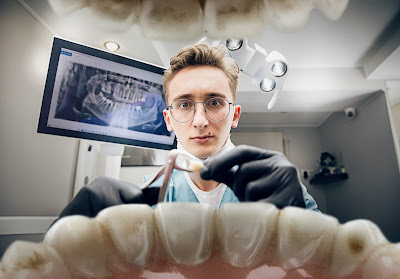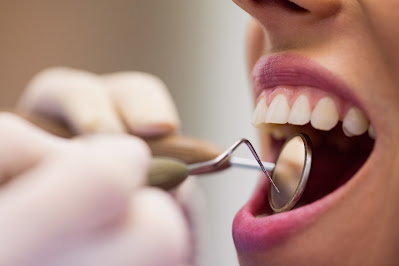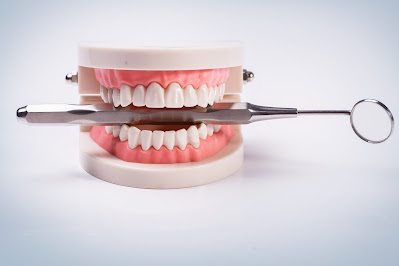Oral Health
Although it affects every part of our life, oral health is frequently taken for granted. Your mouth is a window into your body's wellness. It may display symptoms of systemic infection or nutritional deficits. Lesions in the mouth or other oral issues may be the initial symptoms of systemic disorders, which affect the whole body.
Your oral health matters whether you're 80 or
only 8. Although the majority of Americans today have great dental health and
maintain their natural teeth throughout their lifetimes, cavities continue to
be the most common chronic childhood disease. Even though regular dental exams
and proper oral hygiene can stop the majority of tooth illnesses, almost 100
million Americans choose not to visit a dentist each year. Many people think they should only visit the dentist if they are in pain or suspect something is wrong, yet frequent dental appointments can help them maintain good oral health for the rest of their lives. Do not put off visiting a dentist if you
are in pain due to your teeth. Diagnoses and treatments are more sophisticated
and comfortable than ever because of dentistry's many advancements. Find more related content here Braces VS Invisalign Aligners Which one is Best Orthodontic Treatment?
The link between
oral health and diseases
- When bacteria or other germs from another area of your body, such as your mouth, move through your bloodstream and adhere to specific locations in your heart, endocarditis infection of the inner lining of your heart chambers or valves (endocardium) commonly results.
- Cardiovascular condition some studies suggests that heart disease, blocked arteries, and stroke may be connected to the inflammation and infections that oral bacteria can cause, even if the connection is not entirely understood.
- Low birth weight and early birth have both been connected to periodontitis.
- Pneumonia and other respiratory illnesses can be brought on by certain bacteria in your mouth that can be drawn into your lungs.
Affect your oral
health
- Diabetes increases the risk of gum disease by lowering the body's ability to fight off infection. People with diabetes seem to experience gum disease more frequently and severely.
- According to research, persons with gum disease have a tougher time keeping their blood sugar levels under control. Regular periodontal care can help you regulate your diabetes.
- In persons with HIV/AIDS, oral issues such as uncomfortable mucosal sores are frequent.
- Periodontal bone loss and tooth loss are both associated with the bone-weakening condition osteoporosis. There is little chance that the jawbones could be harmed by a few medications used to treat osteoporosis.
- There are many factors that contribute to gingivitis like smoking, sugary foods & drinks, use of medication, poor brushing habits, HIV or AIDS, hormonal changes in women, heartburn & frequent vomiting.
There
are many best ways to keep your teeth healthy
- Don't forget to brush your teeth before bed
- Don't forget to clean your tongue
- Floss each day
- Utilize the best toothpaste
- Employ mouthwash
- Stop smoking
- Drink more water
- Eat wholesome, crunchy foods
- Keep hydrated
- Eat fewer items high in sugar and acid
- Twice a year, visit the dentist
Identifying
oral health diseases
During a dental exam, the majority of dental and oral issues can be identified. Your dentist will carefully examine your teeth, mouth, cheeks, neck, jaw, and throat during an examination. Find more related content here What could I Assume from the Invisalign Brace Procedure?
To help with a
diagnosis, your dentist may use various tools or devices to tap or scrape your teeth. A dental X-ray of your mouth will be taken by a technician at the
dentist's office, who will make sure to capture images of all of your teeth. If
you are pregnant, be careful to let your dentist know. Pregnant women shouldn't
undergo X-rays.
Your gum pockets
can be measured using a device known as a probe. Your dentist can use this
little ruler to determine whether you have gum disease or gum recession. The
space between teeth in a healthy mouth typically ranges from 1 to 3 millimeters
(mm) in depth. Any number greater than that can indicate you have gum disease.
A gum biopsy may
be done if your dentist discovers any unusual lumps, lesions, or growths in
your mouth. A tiny bit of tissue is taken from the tumor or lesion during a
biopsy. After that, a laboratory will examine the sample under a microscope to
look for malignant cells.
Your dentist can
also request imaging testing if they suspect oral cancer to determine whether
the disease has spread. These are tests X-ray, endoscopy, Mri scan & CT scan
to check.
Type
oral health diseases
It's not
unexpected that so many things can go wrong over time, especially if you don't
take good care of your teeth since we use our teeth and jaws for so many
different activities. The majority of dental and oral health issues can be
avoided with good oral hygiene. At least one dental issue will probably arise
for you in your lifetime.
Cavities
Cavities are
little holes or openings in the hard surface of your teeth that are permanently
damaged. Cavities, also known as tooth decay or caries, are brought on by a
number of things, such as oral bacteria, frequent eating, consuming sugary
beverages, and inadequate tooth cleaning.
Gingivitis
Infections and
inflammation of the gums and bones that surround and support the teeth are the
main causes of periodontal disorders. Its early stage is known as gingivitis.
Cracked teeth
When a crack
develops in your tooth, it is said to have a fractured tooth, also known as a
cracked tooth. Use dental veneers or dental implant services as per your requirement.
Sensitive teeth
When you ingest
hot, cold, sweet, sour, or sour meals and drinks, or even when you breathe
chilly air, your teeth may become sensitive. Pain may be abrupt, or severe, and
radiate deep into the nerve terminals of the tooth. Fluoride, desensitizing
toothpaste, and dental bonding are all treatments.
Oral cancer
The oral cavity,
which comprises the entire mouth when you open it wide and gaze in the mirror,
is where oral cancer, also known as mouth cancer, develops.
Potential
strategies for the oral health of children and adults
- Putting into practice and assessing actions that influence health behavior
- Promoting measures to prevent tooth decay, such as the use of fluoride and dental sealants
- Evaluating and enhancing procedures for keeping an eye on illnesses and disorders of the mouth
- Expanding the ability of State dental health programmers to offer preventative oral health services
- More community health clinics should include dental services.
Conclusion
More than simply your teeth are affected by
your dental health. Your self-esteem may suffer as a result of poor oral
health. Your comfort and general quality of life may also be impacted. Many
issues with oral health start out without any symptoms. The easiest method to
identify an issue before it worsens is to visit the dentist regularly for a
checkup and examination.










No comments:
Post a Comment